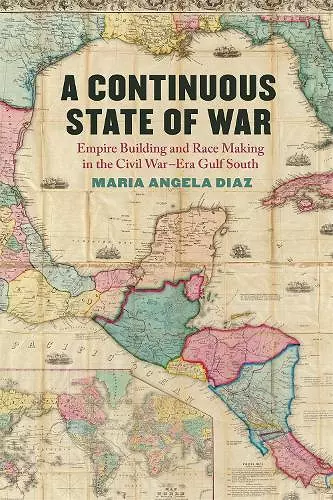A Continuous State of War
Empire Building and Race Making in the Civil War–Era Gulf South
Format:Paperback
Publisher:University of Georgia Press
Published:15th Apr '24
Should be back in stock very soon

An exploration of the ways that violent conflict and racism evolved in the years surrounding the Civil War
A Continuous State of War tells the story of several communities, such as Galveston, New Orleans, and Pensacola, as well as countries such as Mexico and Cuba, to uncover the way that wars within the upper rim of the Gulf of Mexico facilitated American and southern attempts to conquer Latin American nations.
From 1845 to 1865 the Gulf of Mexico was at the center of American expansion and southern imperialism. A Continuous State of War tells the story of several communities, such as Galveston, New Orleans, and Pensacola, as well as countries such as Mexico and Cuba, to uncover the way that wars within the upper rim of the Gulf of Mexico facilitated American and southern attempts to conquer Latin American nations. In the push for westward expansion that preceded the Civil War, white southerners along with other Americans engaged in violent conquest in Latin America and the American West. Through the wars that are chronicled here, white southern concepts of race became more rigidly fixed.
Maria Angela Diaz covers several conflicts leading up to the Civil War with Mexicans, Cubans, and Native Americans. She places the Civil War within this framework and follows the trajectory of relations with Latin America through the end of the Civil War and ex-Confederates’ attempts to emigrate abroad. Gulf Coast communities facilitated both the physical efforts to seize territory and the construction of the highly racialized imperialist ideas that reimagined Latin America as a region that could secure the South’s future. Yet the pursuit of that territory created a fluctuating and uncertain situation that shaped the choices of the diverse peoples who lived along the upper rim of the Gulf of Mexico in ways they did not expect.
By pulling together such a rich and multitextured history, A Continuous State of War offers an original and valuable analysis of the complicated ways in which race, movement, and geopolitics intersected to shape the history of the Gulf and the United States' understandings of empire during the Civil War Era.
-- Brian Schoen * author of The Fragile Fabric of Union: Cotton, Federal Politics, and the Global Origins of the Civil War *This is a welcome partially narrative history of the role of the Gulf South in U.S. territorial expansion after 1836 that will appeal to college teachers looking for a readable volume on territorial expansion for upper division and graduate courses in history. . . . I’ve read a great deal about international relations during the Civil War, but this analysis stands out.
-- Amy S. Greenberg * author of Lady First: The World of First Lady Sarah Polk *A thought-provoking, engaging, and complex history. . . . Combining social, geopolitical, ethnic, and cultural themes, Diaz constructs a history that captures the experiences and convictions of the Gulf South during these momentous decades. By including accounts from Latin America and Mexico, Diaz weaves into the narrative the racial tensions, expansionist mindsets, and military ventures that earmarked these decades.
-- Phill Greenwalt * Emerging Civil War *A Continuous State of War joins a burgeoning field of Civil War scholarship that highlights understudied yet central sites of antebellum contestation. . . . One of the most important aspects of Diaz’s book is the emphasis placed on how Native American, Mexican, and African Americans resisted racist and imperialist ideas and efforts. . . .Ultimately, Diaz implores historians to consider the origins and legacy of efforts to craft racist imperialist imaginaries in the pursuit of American expansion.
-- Kathryn Angelica * Gulf South Historical Review *In this well-written account of race and empire in the nineteenth-century United States, Diaz provides an overview of an important period that, as many scholars have demonstrated, had profound consequences for Latin America. Graduate students and specialists alike will appreciate Diaz’s analysis of how Gulf South communities both participated in and helped impel Southern imperial projects and dreams.
-- Evan C. Rothera * Hispanic American Historical ReviISBN: 9780820366494
Dimensions: unknown
Weight: unknown
242 pages